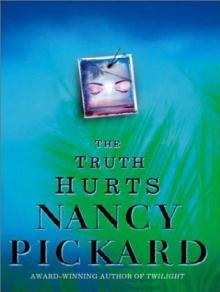- Home
- Nancy Pickard
Twilight Page 19
Twilight Read online
Page 19
I recognized all three of the cops, but the medical technicians were not the same pair who had rescued David less than twenty-four hours earlier. These were a different couple of lifesavers, a man and a woman, on a different shift. The cops and I nodded in a friendly way to one another, but I didn’t speak to them, since this was all business, and they were concentrating on it.
Two of the cops, both of them men, had been talking to Nellie and Bill as we walked in. It looked as if they’d just started their interview; the shorter of the two cops was still uncapping his pen. The third cop—a woman—was loading film into a camera. She’d have a lot of pictures to take, I thought, not envying her the task. Cops had to be so exacting about such things, photographing everything that looked as if it could possibly be evidence, and notating everything, down to the f-stop of the film and the precise time they took the picture. With the mess we’d seen in the living and dining rooms, she’d be lucky to finish that job by noon.
“Lieutenant?” The cop who had been speaking to Nellie when we walked in looked over at us. “You want to take over here?”
Nellie saw me and said, “Jenny!”
I rushed to her and dropped to my knees in front of her, taking her hands and gently squeezing them as I looked into her face.
Behind me, Geof said, “Sure, I’ll do that. If I talk to the Kennedys, it would set you free to help collect evidence.” He shook his head again. “There’s enough of it out there.”
The woman cop looked up from her camera and rolled her eyes in passionate agreement with that assessment.
“Yes, sir,” said the short cop, “that would sure help.”
If they wondered why we were there, they didn’t ask; if they asked Geof later, he could tell them that he didn’t really know.
The three uniformed officers quickly shifted to the front rooms, leaving us alone with the Kennedys and the paramedics. Geof pulled an empty chair out from under the kitchen table and sat down in it. He took his own notepad out of his inside coat pocket and his own capped pen that came from the same supply storeroom.
I lowered my behind to the floor and curled my legs in.
Bill sat in the third chair, his hands on top of the table, his face looking as pale and blank as a brand-new bulletin board. He was looking straight ahead, ignoring us, ignoring the uniforms, paying no attention to anything except whatever shocking images were playing themselves out in his mind’s eye. He never turned his head, seeming deaf and blind to all of us.
I didn’t know where dear Ardyth was.
But I had a sudden mental image of her upstairs in her old bedroom, frilly white bedspread and all, using her old pink Princess phone to call her mentor, Peter Falwell. But then I thought, more charitably, maybe she was using the bathroom.
The paramedics hovered, looking hurried and worried.
“Lieutenant,” said one of them, a stocky, good-looking woman with hair dyed so yellow that her head looked like a spring crocus, “we want to take these people to a hospital. No bleeding, no bones broken, or anything like that, but he looks like he could go into shock any minute now, and we think they both need to be checked for internal stuff, you know what I mean? She looks like she got hit pretty hard, and all we’ve got is bruising and swelling so far, but it could be worse, you know? So can you make this fast, or better yet, can you interview them in the hospital?”
“No hospital!” Nellie said loudly.
I couldn’t actually see anything wrong with her—until I noticed a long red welt swelling up near her jawline. And then I noticed another red raised mark under her right eye. Nellie was wearing her usual work clothes—a dark, longsleeved dress and hose—so she was pretty well covered up, and I wondered if other vicious marks lay hidden beneath her clothes. She smelled of smoke, as did they all. The whole kitchen reeked of it, and I guessed that all of the cops and medics had been working the fire, as well. Geof and I were probably the only ones who’d had a chance to change clothes, much less to shower or rest. I hadn’t been doing anything heroic—as they all had—but I knew we must all have been a pretty exhausted-looking bunch of people, even given the two hours of sleep that Geof and I had grabbed. I felt selfish about that sleep, as I saw the bags under the medic’s eyes as she spoke to him.
I touched my fingers to the air just above Nellie’s jaw.
“Where else did they hurt you?”
Tears sprang to her eyes, as she pointed, rather than telling me. Both arms. Her back. Legs, chest. Hips.
“Bruises,” the other paramedic explained, shoving the word out in an indignant, staccato explosion. “They hit her with, like, a stick, or something.”
I flinched at the awful image.
“But we’re okay,” Nellie said, still speaking in a louder voice than normal, almost as if she were gathering strength from the sound of her own voice. “We can take care of ourselves now. We’re not leaving home.” She looked up at Geof. “I want to stay home!”
He glanced over at the medics.
Both of them shrugged, and the woman said, “Can’t force ’em. They’re not dying, or anywhere close to it. Should we hit the road then, Lieutenant? It’s a long way back here, if they should happen to change their minds …”
“We won’t!” Nellie said, her voice growing ever firmer. “Will we, Bill?”
Her husband didn’t turn his head, didn’t answer.
“See what I mean?” the woman paramedic said to Geof.
But Nellie called him sharply out of his funk. “Bill!”
He jerked, as if coming awake, and began talking, as if she’d pulled a cord in his back. “A gang,” Bill said, as if talking only to the wall straight in front of him. He looked older, weaker, vulnerable, which made me feel sad for both of them. He looked so frightened, as he said, “What did they want here? That fellow, he hit her. He kept hitting her. I couldn’t stop him. Who were they? Where did they come from? What did they want with us? Do you think they’ll come back?”
“Oh, Bill,” Nellie said, in a much softer voice. She reached for one of his hands and squeezed it, though he didn’t respond to her. “Honey, don’t worry, it was some kind of mistake, I’m sure it was. They got the wrong house. They’ll never come back to bother us again. You tried hard to fight them, Bill.” Her voice broke, and she bowed her head, and began to sob. Through her tears, we heard her say, “He did. He really did. He tried so hard to fight them. He was so frightened, and I was, too, and he tried so hard to make them go away. Bill was so brave.” Through her tears she looked at him, and she took her hand and turned his chin around until he faced her. “Honey, it isn’t your fault that they hit me. You were brave. You stood up to them like a giant. You were a hero. My hero. Please, don’t be so upset, Bill! It’s over now.”
I thought Bill didn’t look convinced; he looked shamed.
Damn this society’s macho crap! I thought, unhappy that Bill should have to feel humiliated because he wasn’t “man” enough to stand up to an entire gang of hoodlums all by himself. He might have actually saved Nellie’s life, and his own, I suddenly thought, and so I said it out loud.
Nellie looked down at me, gratitude in her eyes.
“He did save my life,” she said, and then to him: “You did, Bill.”
“That fellow,” he said, looking very much as if he might start crying, too. “He hit you. I can’t believe he hit you. I wanted to make him stop, I wanted to …”
“You did,” Nellie said, in that sharp voice I’d heard her use so often with Bill. Only now I thought I understood it better. It was sharp the way a mother’s voice is sharp: Stop that! And this time, at least, she was only trying to get him to snap out of his shock, his shame, his sorrow. His reaction, more than the devastation in the front rooms, even more than Nellie’s bruises, made me realize what a terrifying ordeal they had just survived—and on top of the destruction of their entire life’s work. It was almost beyond ordinary comprehension, their loss in so few hours. If Bill looked like the shell-shocked victim of a war,
well, no wonder. And if Nellie acted toward him like a cross between a battlefield nurse and a sergeant, well, that was nothing to wonder about, either.
And where was their only child, to comfort them?
Now that was something to wonder about.
Finally, it was just the four of us left in the kitchen.
Geof started them off with some gentle, mundane types of questions, to help them relax a little, to ease everybody’s tension. How they spelled their full names. Their ages. Their occupations, as if he didn’t know. Their address, their phone number, et calming cetera. Geof tried to encourage Bill to answer the questions regarding himself, but Nellie kept interrupting, answering everything for him, until finally Geof said, “Mrs. Kennedy—”
“Nellie. You make me feel so old!”
“I’m sorry.” He smiled. “You’re certainly not that, although this night you’ve had would have aged me about a hundred years, I think. Are you holding up all right? I’ll try to make this as quick as possible, so you can get to bed—”
“We’ll never sleep tonight.”
“Well, we can always do this again tomorrow—”
“I’d rather be here, doing it now,” she assured him. “If we do this, then I don’t have to think about everything that has happened to us tonight.”
He tried again. “I was just going to say, perhaps you would let Bill answer for himself?” He was exceedingly tactful. But when she did keep quiet, some of Bill’s answers seemed those of a man still in a state of profound shock.
“What time’d you get home, Bill?”
“Time to go home,” Bill said, looking at Nellie.
She said, “It was one-fifteen, I saw it on the clock in the car.”
“Both of you come home together, Bill?”
Bill shook his head, but Nellie said, “Yes, sure, in my car, we always just take one car to work, no need for both of us to drive. I always drive, I like to, actually …” She laughed a little. “I’m a better driver than he is, he’s a little absentminded about his driving, like he is about most things. Right, Bill?”
Geof gave up the valiant effort to get Bill Kennedy to talk. He looked at Nellie, smiled encouragingly, and said, “Well, why don’t you just tell me what happened, what you saw, everything you can remember, from the time you left the fire—”
She told about leaving, heartsick, being helped through the maze of traffic by the police, coming out onto the open highway, and driving slowly home, so tired and upset she was afraid of having an accident. She didn’t recall seeing anything, or even paying attention to anything, on the way home.
“I don’t even remember driving home,” she said. “It was one of those drives you have when you just drive by instinct, because you’re thinking about other things. I was thinking about the fire. I pulled into our driveway, I guess, not that I exactly remember doing it, and … I don’t know, there wasn’t anything unusual or special. We just parked the car in the garage like we always do, and we came into the house like we always do.”
“Was it locked, Nellie?”
“No.” She looked embarrassed, then defensive. “We don’t lock our houses out here, so I can’t claim it’s like they had to break in. I guess they just walked in. And they all had on gloves, Lieutenant—Geof—all of them, so there’s absolutely no point in your looking for fingerprints, because you’re not going to find a single one. Not one.”
“What kind of gloves, Nellie?”
She blinked and looked at Bill. “Do you remember, Bill?”
“I don’t remember gloves,” he said. “I don’t think they had on any gloves, Nellie, did they?”
“Yes, they did, Bill! Yellow sorts of gloves, you know, those soft leathery things like farmers wear sometimes.”
Suddenly Bill broke in, as if a verbal dam had broken in him, releasing the words he’d been too shocked to give us before now. “I came in the front door, and there was this fellow standing over in the corner. I’d never seen him before. I said, what are you doing here? And I knew he was up to no good, and I wanted to grab something, but this fellow, he had these other people with him, these two women and these other two men, and they were out in the kitchen, out here where we are, and they all came in, and they started tearing things up!” Bill glanced at his wife, and the look they shared was one of horror remembered.
She said, “I came in behind Bill.”
“And that fellow,” Bill said, “he had something in his hands and he was hitting things—”
“And I started screaming,” Nellie interjected, “and the man saw me, and he ran over and started hitting me.”
“With what?” Geof asked quickly.
“With a lamp,” Nellie said, leaning forward, her breathing coming quick, as if she were panicked and under attack all over again. “With one of our lamps, is what it was, the green one with the ivory shade on it.” She made an hourglass shape with her hands, to show what it looked like. “It didn’t break.” Her eyes were wide, round, as we all shared the wonder of the lucky fact that the attacker hadn’t broken it on her body, and that she hadn’t been cut with the edges of a broken lamp.
“What did he look like, Nellie, this man?”
But she shook her head, tears filling her eyes again.
“Short, tall? Skinny, fat?”
“I don’t know, I don’t know.”
“It’s okay, it may come back to you. Do you remember the color of his skin?”
“I don’t know!” Nellie said, crying again.
“He was a white man, but some of them were black people,” Bill said, suddenly. “The women, they were black women.” He frowned with the effort of recalling their appearances through the fog of his own terrific shock. “One of the other men, he may have been black, too. I don’t understand it at ail! Why did they come here? What do they want with us?”
Geof couldn’t get any better descriptions out of either Nellie or Bill, not descriptions of hair, faces, nothing more. She said the group of people had all been wearing lots of clothing, outerwear, coats and hats, that covered their weight, their bodily features.
“I don’t know how you know they were black people or white people,” she said, in an exasperated, worn-out tone of voice to her husband. “They were all covered up! I know I couldn’t tell if they were Asian or white … or Martian!”
But Bill stubbornly insisted on his version.
They’d all worn masks, she told us, making his certitude about the color of their skin—or even their gender—seem even more unlikely. Gloves. Heavily clothed. Masks. Nothing showing. And nothing left to identify them, at least nothing from their own bodies, no fingerprints, no hair, no blood, nothing at all to scrape up and bag and take to a crime lab.
“No,” Bill said, objecting to her version. “Masks?”
“Oh, Bill.” She laughed a little. “Our masks. Like we sell, honey. Those ones that look like real people. Jimmy Carter. Bill Clinton. Hillary Clinton, you know, those kinds of masks. Did you think we were being attacked by the National Democratic Party?” Nellie started to giggle through her tears, which made me start to laugh, too, and Geof had to smile, through his official demeanor. Even Bill smiled a little.
“I guess not,” he said. “I don’t remember masks.”
“What did they say?” Geof asked.
“They were talking in the kitchen,” Bill said, “when I came in. I could hear them. I don’t know what they were saying, but I heard one of them—one of the men—say to one of the women, ‘He doesn’t want us to be here.’”
Geof and I glanced at each other. Very strange.
“Are you sure?” Geof asked, because he had to.
Bill nodded and said, “But that fellow, the one who attacked Nellie, he never said anything.”
“That’s right,” Nellie agreed. “Not one word.”
“Did he hit you, Bill?”
Although Bill shook his head, Nellie said, “Oh, yes, he did! Bill, you just don’t remember, you were so busy trying to stop him! Where
do you think you got those bruises! He hurt you, all right!” She looked at me, her eyes showing as much shock now as her husband’s. “I’ve never been so …” Her voice dropped. “Frightened.”
Bill said, “Why was that fellow so angry? Did we do something to make those people mad at us?”
I hoped some of this was making sense to the lieutenant, because I couldn’t make heads or tails out of it; it was turning out to be one of the strangest stories, and one of the most disturbing, that I’d ever heard. A gang of masked attackers. Furious. Destroying everything in their path. And for what possible reason?
But then why, too, would anyone beat a boy lying in the road?
The rampage had halted the minute Nellie got to a phone and managed to tap out 911.
“He just stopped,” she said, looking amazed. “I yelled at him, I said, I’m calling the police! And he dropped the lamp, and he stopped hitting me and … he just stopped.”
“And then what did he do?” Geof prodded her.
“He was gone,” she said. “Just like that. One minute he was there, and crazy, a crazy man, and then he left, they all left, and everything was quiet again, and we were safe. Although we didn’t know if we were safe. We didn’t know if they’d come back, but we didn’t think they would, not with the police coming. And then I called you, Jenny, because … because I just needed to have a friend to be with us.”
I put my arms around her, gently, and hugged her.
“Do you think,” she asked, “it was the same people who set fire to our store?”
“What,” Geof asked, speaking slowly, “makes you think somebody set fire to it, Nellie?”
She blinked and looked as startled as an owl.
“Why,” she said, “I don’t know why I think that, I just … do. Maybe, maybe it’s because I’ve always been so careful about our wiring, for one thing. Our store was so old, with all that wood, and I always felt so responsible for the safety of our staff and our customers. I guess I just can’t believe it was anything accidental, like an electrical fire. And we know it wasn’t lightning, don’t we? And we never allow anyone to smoke in the store. Never. There weren’t any space heaters. There wasn’t anything that might cause a fire, not one single thing that I know of. So, it had to be that somebody set it.” She looked from one to the other of us, sadly. “Doesn’t it?”

 The Scent of Rain and Lightning
The Scent of Rain and Lightning No Body
No Body The Secret Ingredient Murders: A Eugenia Potter Mystery
The Secret Ingredient Murders: A Eugenia Potter Mystery The 27-Ingredient Chili Con Carne Murders: A Eugenia Potter Mystery
The 27-Ingredient Chili Con Carne Murders: A Eugenia Potter Mystery Twilight
Twilight Marriage Is Murder
Marriage Is Murder I.O.U
I.O.U The Virgin of Small Plains
The Virgin of Small Plains Generous Death
Generous Death The Whole Truth
The Whole Truth The Blue Corn Murders
The Blue Corn Murders Say No to Murder
Say No to Murder Confession
Confession Dead Crazy
Dead Crazy The Truth Hurts
The Truth Hurts Bum Steer
Bum Steer